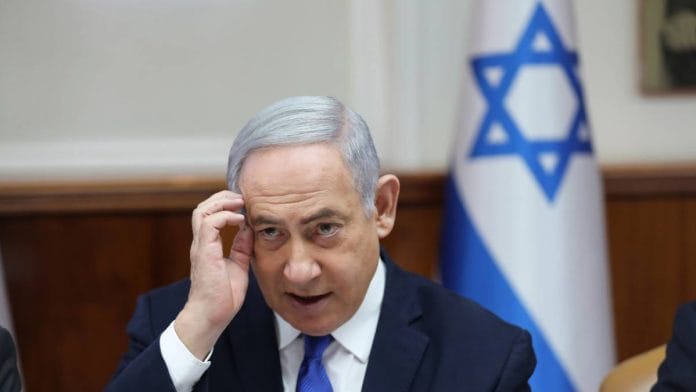New Delhi: Flights to and from Lebanon capital Beirut have been cancelled while two persons are reported to have been killed and three wounded in an Israeli drone strike in the nation’s south Monday. Lebanon is bracing for Tel Aviv’s retaliation to a rocket attack Saturday that killed 12 people, primarily children, in Israel-occupied Golan Heights in Syria.
Israel has blamed Saturday’s strike on a football field in the town of Majdal Shams in the Golan Heights on Shiite Lebanese group Hezbollah, raising fears of a full-scale war breaking out between Tel Aviv and the militant outfit. Hezbollah has firmly denied having a role in the attack.
India Monday published a travel advisory for its citizens travelling to Lebanon, urging them to “exercise caution” and to stay in touch with its embassy in Beirut.
On Sunday night, Israel’s security cabinet authorised Prime Minister Benjamin Netanyahu for a response to the rocket strike.
Netanyahu has vowed that Hezbollah, a Shiite political party which has a military arm in southern Lebanon, will “pay a heavy price for this attack, one that it has not paid so far”, while the Israeli military struck targets in Lebanon in the early hours Sunday.
The intensity of these strikes, however, was reportedly similar to those Israel has been conducting over the last 10 months in cross-border attacks against Hezbollah in Lebanon.
World leaders have scrambled to prevent further escalation between Israel and Hezbollah. Senior officials from the US, Egypt and Qatar met in Rome Sunday to find a breakthrough for the release of hostages taken by Hamas and a ceasefire in Gaza, with added urgency in the hope that a deal could prevent further escalation between Israel and Hezbollah.
Golan Heights, north-east of Israel on the south west border with Syria, was occupied by the former after the 1967 Six-Day War. The vast majority of its population are from the Druze communities, who still identify themselves as Syrian for the most part.
In 1981, Tel Aviv annexed the region, which is not recognised by most of the world. The US under president Donald Trump recognised the annexation of Golan Heights in 2019.
Iran-backed Hezbollah and Israel have been exchanging artillery fire since October 2023. Hezbollah started firing at Israeli positions on its southern border in support of Hamas, the Palestinian militant group which launched a series of attacks on Israeli towns near the border with Gaza on 7 October, 2023, killing around 1,150 people and taking 250 hostage.
Tel Aviv retaliated, bringing its full military forces to bear, with the conflict still ongoing nearly 10 months later and at least 39,000 Palestinians killed, according to the Gazan health authorities.
While Hamas is considered to be well equipped for a militia, the Hezbollah militia is considered to be the world’s most powerful non-state actor, with better equipment and training. Any full-scale war between Israel and Hezbollah could have potentially devastating consequences for people in the region.
Also Read: 2-state solution for Israel-Palestine: History of the idea, Netanyahu’s stance & India’s position
‘Army of God’
Hezbollah was founded after Israel’s invasion of Lebanon in 1982. Funded by Iran’s Revolutionary Guard Corps, the group was also trained by Tehran to fight against Israel.
In 1983, Hezbollah, which means “Army of God”, carried out deadly blasts in Beirut, killing 299 American and French troops stationed there. The organisation became Iran’s most important proxy in the region as Tehran looked to increase its regional footprint.
Hezbollah pledged its loyalty to the Supreme Ayatollah of Iran, vowed the destruction of Israel and called for the creation of an Islamic Republic in Lebanon. In 1992, the organisation went through a change after Hassan Nasrallah became its Secretary General.
The previous leader of Hezbollah, Abbas Al-Mussawi, was assassinated by Israel.
Politically, Hezbollah is one of the largest parties in Lebanon, winning the maximum number of preferential votes during the 2022 legislative elections in the country, as well the third largest number of seats.
The military arm, however, is where the organisation derives its real power from. According to media reports in 2021, Nasrallah boasted that Hezbollah has 1,00,000 trained fighters. ThePrint cannot independently verify this claim.
Tehran has supplied Hezbollah with thousands of rockets, missiles and small arms, along with hundreds of million dollars in monetary support, apart from training its fighters, according to the US State Department.
Furthermore, the militia has battlefield experience, fighting in Syria in support of the Bashar Al-Assad-led regime. In 2006, Hezbollah reportedly attacked and heavily damaged an Israeli warship with a missile – highlighting fears of the strength of its weaponry.
According to estimates by the Centre for Strategic and International Studies in 2018, Hezbollah has about 1,30,000 rockets in its stockpiles. Its weaponry is also said to include unguided artillery rockets, and ballistic, anti-air, anti-tank and anti-ship missiles.
Global scramble for ‘restraint’
While the world awaits Israel’s response to Saturday’s strike, leaders across the globe have urged restraint and called for international investigations on the matter.
US Secretary of State Antony J. Blinken, who was in Tokyo Sunday for the Quad’s foreign ministers’ meeting, urged for restraint to ensure the conflict does not spread or escalate.
US Senate Majority Leader Chuck Schumer told the media he hopes there are “moves to de-escalate” the situation.
UK Secretary of State for Foreign Affairs David Lammy said on X Sunday: “The UK condemns the strike in Golan Heights that has tragically claimed at least 12 lives. We are deeply concerned about the risk of further escalation and destabilisation. We have been clear Hizballah must cease their attacks.”
The High Representative of the European Union for Foreign Affairs and Security Policy Josep Borrell called on social media for an “independent international investigation” into Saturday’s strike and for all parties to “avoid further escalation”.
Canada has stated that it is “gravely concerned” about escalation after the Golan Heights strike.
(Edited by Nida Fatima Siddiqui)
Also Read: 2-state solution for Israel-Palestine: History of the idea, Netanyahu’s stance & India’s position






